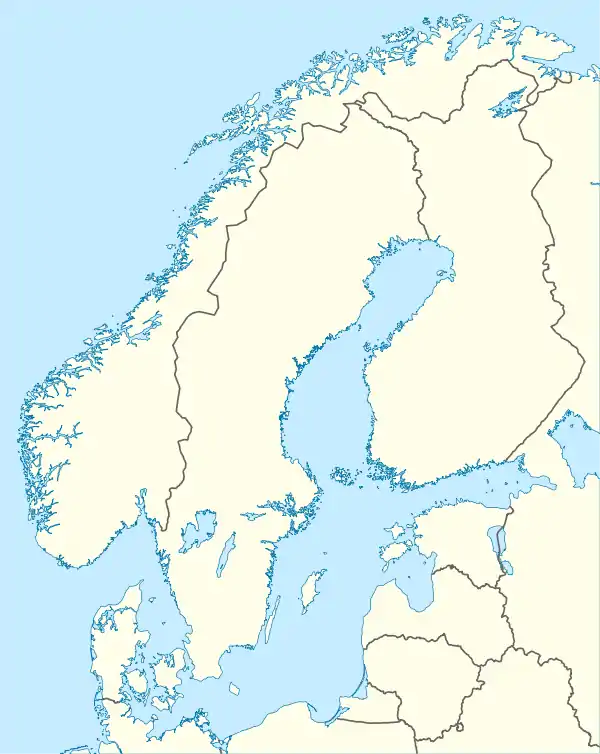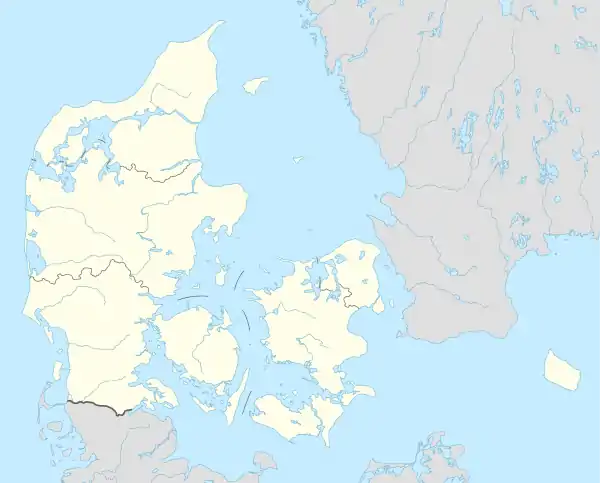The bidding process for the UEFA Women's Euro 2025 ended on 4 April 2023 in Lisbon, Portugal, when Switzerland was announced to be the host.
Hosting requirements
Media agencies revealed on 11 November 2020, that the European football governing body UEFA will decide on the host of UEFA Women's Euro 2025 in December 2022.[1] The application for hosting must be submitted no later than August 2022.[2] The bidding concept for UEFA Euro 2024 was ratified on 1 February 2019.
The tournament is expected to continue the format of the 2017 and 2022 editions, with a total of 31 matches taking place for a duration of up to 25 days, with 16 teams competing in the tournament.
The requirements for the stadiums are as follows:
- 6-8 stadiums with 8,000-20,000 seats
- 1 stadium with at least 20,000 seats (potential final hosting)
- 4 quality training facilities per stadium
- 4 hotels per stadium
Schedule
| Date | Notes |
|---|---|
| 1 June 2019 | Bid committee announced |
| 9 August 2019 | Meeting with former and upcoming hosts |
| 29 August 2019 | UEFA Women's Euro 2025 Workshop |
| 12 October 2022 | Deadline for submission of bids[3] |
| 4 April 2023 | Announcement of hosts by UEFA Executive Committee[4] |
Bids
Eight European national associations signalled to UEFA their interest in staging UEFA Women's Euro 2025:
Confirmed bids
Poland
On 3 June 2021, Zbigniew Boniek, head of the Polish Football Association, announced that the association had filed their bid at UEFA to host the 2025 Women's Championship, citing women's football as gaining in popularity in many European countries, including Poland. Poland hosted previously the Men's Euro in 2012 with Ukraine and the 2019 FIFA U-20 World Cup.[5]
The following are the 10 host cities and stadiums selected for Poland's bid:[6]
- Wrocław – Stadion Wrocław, capacity 45,105
- Gdańsk – Stadion Gdańsk, capacity 43,615
- Kraków – Stadion Miejski im. Henryka Reymana, capacity 33,326
- Warsaw – Stadion Wojska Polskiego, capacity 31,800
- Białystok – Stadion Miejski (Białystok), capacity 22,386
- Łódź – Stadion Miejski im. Władysława Króla, capacity 18,029
- Lublin – Arena Lublin, capacity 15,500
- Tychy – Stadion Miejski (Tychy), capacity 15,500
- Gdynia – Stadion Miejski (Gdynia), capacity 15,139
- Bielsko-Biała – Stadion Miejski (Bielsko-Biała), capacity 15,076
"Nordics 2025": Denmark, Finland, Norway, and Sweden
On 15 October 2021, the Danish Football Association, announced that the Nordic countries (Denmark, Finland, Norway, and Sweden) with support from Iceland and Faroe Islands, have confirmed their bids to host the UEFA Euro 2025. Following statement, where mentioned by president of the Danish Football Association (DBU) Jesper Møller saying, "We at DBU and in the Nordic football associations have very ambitious visions for the development of women's football. For four years, we have worked closely with our Nordic colleagues to create a strong bid for a final round. We are convinced that a Nordic host for the UEFA Euro 2025 will be fantastic for women's football - fans, players, stakeholders and UEFA".[7]
Head of Women's Football Development Manager in the Finnish Football Association Heidi Pihlaja said in a press release: "The European Championship finals bid, together with the other Nordic countries, is a key part of our goal to strengthen football as a sport for women and girls". All four countries previously hosted the tournament in 1984, 1987, 1991, 1995, 1997, 2009 and 2013.[8] If the bid is successful, it will be the second time in the history that four countries co-hosting one major football tournament, after the men's 2007 AFC Asian Cup (hosted by Indonesia, Malaysia, Thailand and Vietnam).
The following are the 9 host cities and stadiums selected for Nordic bid:[9]
 Copenhagen – Parken Stadium, capacity 38,065
Copenhagen – Parken Stadium, capacity 38,065 Odense – Odense Stadium, capacity 15,633
Odense – Odense Stadium, capacity 15,633 Helsinki – Helsinki Olympic Stadium, capacity 30,084
Helsinki – Helsinki Olympic Stadium, capacity 30,084 Tampere – Tampere Stadion, capacity 16,800
Tampere – Tampere Stadion, capacity 16,800 Oslo – Ullevaal Stadion, capacity 28,000
Oslo – Ullevaal Stadion, capacity 28,000 Trondheim – Lerkendal Stadion, capacity 21,405
Trondheim – Lerkendal Stadion, capacity 21,405 Gothenborg – Gamla Ullevi, capacity 18,600
Gothenborg – Gamla Ullevi, capacity 18,600 Solna – Friends Arena, capacity 50,000
Solna – Friends Arena, capacity 50,000 Stockholm – Tele2 Arena, capacity 30,000
Stockholm – Tele2 Arena, capacity 30,000
France
France has never hosted the UEFA Women's Euro before, but the French Football Federation declared its interest in hosting it for the first time in the country's history. If France is selected, it would mark six years after France hosted the FIFA Women's World Cup.[10] Nevertheless, the country already hosted the 1960, 1984 and 2016 men's Euros, in which they can be used for the potential Women's Euro.
The following are the 8 host cities for France's bid:
- Lyon - Parc Olympique Lyonnais, capacity 59,186
- Paris - Parc des Princes, capacity 48,583
- Lens - Stade Bollaert-Delelis, capacity 38,223
- Nantes - Stade de la Beaujoire, capacity 35,322
- Metz - Stade Saint-Symphorien, capacity 30,000
- Rennes - Roazhon Park, capacity 29,194
- Valenciennes - Stade du Hainaut, capacity 25,172
- Reims - Stade Auguste-Delaune, capacity 20,519
The reserved venues are as follows:
- Le Havre - Stade Océane, capacity 25,178
- Troyes - Stade de l'Aube, capacity 20,400
The scrapped venues are as follows:
- Nice - Allianz Riviera, capacity 35,624
- Grenoble - Stade des Alpes, capacity 20,068
Switzerland
Switzerland looks to host its first-ever UEFA Women's Euro in the country's history. the Swiss Football Association confirmed their interest in November 2021. If awarded, it would be seventeen years after Switzerland co-host the Men's Euro with Austria.[11] On 23 March 2022, Liechtenstein Football Association joined the Swiss bid, which Hugo Quaderer, head of LFV, said: "Liechtenstein football fans have never had the opportunity to experience games for one of the most important cups in European football live, practically on their doorstep. We would therefore be very happy if Switzerland were awarded the contract with Vaduz as the venue."[12] However, by September 2022 plans for Liechtenstein's part of the bid were scrapped, along with Swiss town, Schaffhausen. Lausanne withdrew as a venue prior to the vote to focus on hosting the 2025 Swiss Federal Gymnastics Festival.[13]
The following are the 8 host cities and stadiums selected for Switzerland's bid:[14]
- Basel – St. Jakob-Park, capacity 38,512
- Bern – Stadion Wankdorf, capacity 31,783
- Geneva – Stade de Genève, capacity 30,084
- Zürich – Letzigrund, capacity 26,104
- St. Gallen – kybunpark, capacity 19,694
- Lucerne – Swissporarena, capacity 16,800
- Sion – Stade Tourbillon, capacity 16,263
- Thun – Stockhorn Arena, capacity 10,398
The scrapped venues are as follows:
- Lausanne – Stade de la Tuilière, capacity 12,544
- Vaduz – Rheinpark Stadion, capacity 7,584
- Schaffhausen – Stadion Breite, capacity 7,300
Cancelled bids
Denmark
In February 2019, the Danish Football Association stated its intention to bid, inspired by the recent success of the Denmark women's national football team. A joint bid with the other Nordic countries was also mentioned to be possible.[2] Denmark hosted the UEFA Women's Euro 1991, with the host cities of Aalborg, Frederikshavn and Hjørring. As of July 2020, a bidding committee has already been set up to facilitate the Danish attempt to host the tournament.[15] However, according to the president of the Danish Football Association Jesper Møller, there will also be a modernization of several of the Danish stadiums if the desire to apply should become a reality.[16]
On 25 March 2021, the Danish regional television station TV 2/Fyn, announced that they given access to documents, through Odense Municipality, where it appears that 12 Danish cities would be potential host cities for the tournament in 2025.[17][18] A timetable in the annexes states that the interested host cities have one year from now to decide whether they want to take their interest seriously.
The following are the 12 host cities and stadiums selected for Denmark's potential bid:[17]
- Copenhagen – Parken Stadium, capacity 38,065
- Brøndby – Brøndby Stadium, capacity 29,000
- Aarhus – Ceres Park, capacity 19,433
- Esbjerg – Blue Water Arena, capacity 18,000
- Odense – Nature Energy Park, capacity 15,790
- Aalborg – Aalborg Portland Park, capacity 13,800
- Herning – MCH Arena, capacity 11,423
- Horsens – CASA Arena Horsens, capacity 10,400
- Randers – Cepheus Park Randers, capacity 10,300
- Haderslev – Sydbank Park, capacity 10,000
- Silkeborg – JYSK Park, capacity 10,000
- Viborg – Energi Viborg Arena, capacity 9,566
On 15 October 2021, the president of the Danish Football Association Jesper Møller announced on a press conference that his association abandoned its original plan to host the tournament independently and will focus on the plans for the Nordic candidacy.[8]
Ukraine
The Ukrainian Association of Football had declared its interest in hosting the tournament in November 2021. It would have marked the first time Ukraine hosted the event, thirteen years after hosting the Men's Euro with Poland.[19] However, following the 2022 Russian invasion of Ukraine, the bidding plan of Ukraine was put in limbo due to the war and security concerns.
External links
References
- ↑ "UEFA to launch sports category tender process for UEFA Women's Football Competitions for 2021-25". UEFA. 11 November 2020.
- 1 2 "Denmark wants to stage Women's European Championship in 2025". BBC Sport. 7 March 2019. Retrieved 1 March 2021.
- ↑ "Switzerland add to list of those bidding for Women's Euros in 2025". RTÉ. 14 September 2022. Retrieved 24 September 2022.
- ↑ "UEFA Executive Committee agenda for Nyon meeting" (Press release). UEFA. 18 January 2023. Retrieved 24 January 2023.
- ↑ "Mistrzostwa Europy kobiet 2025 również w Krakowie? Jest na to szansa!". Polsat Sport. 3 June 2021. Retrieved 20 June 2021.
- ↑ "Kolejna wielka piłkarska impreza w Polsce? Zbigniew Boniek zabrał głos". Sportowy24. 3 June 2021. Retrieved 10 January 2022.
- ↑ "Norden vil have værtskabet for kvinde-EM i 2025". Danish Football Association (in Danish). 15 October 2021. Retrieved 27 October 2021.
- 1 2 "Finland joins Nordic bid to host Women's Euro 2025". Yle. 15 October 2021. Retrieved 27 October 2021.
- ↑ "Nordic Countries Bid to Host Euro 2025". Life in Norway. 7 April 2022. Retrieved 2 May 2022.
- ↑ "Football: France could organize the Women's Euro in 2025". Archyde. 6 November 2021.
- ↑ "L'Association suisse de football convoite l'Euro féminin 2025". Le Temps (in French). 26 November 2021.
- ↑ "Schweiz und Liechtenstein reichen Bewerbung für die EM 2025 ein". Soccerdonna (in German). 26 March 2022.
- ↑ https://www.blick.ch/sport/fussball/frauen-fussball/frauen-em/chefin-marion-daube-vor-vergabe-der-frauen-em-2025-die-wichtigsten-fuenf-minuten-meines-lebens-id18456017.html
- ↑ "Kickoff Kampagne Schweizer Kandidatur für die UEFA Women's EURO 2025" (in German). Swiss Football Association. 14 September 2022.
- ↑ "Women's Euro 2025 Budkomité" (in Danish). Danish Football Association. Retrieved 7 July 2021.
- ↑ "Kvinde-EM på hjemmebane? DBU-formand kalder det en fifty-fifty" (in Danish). Danmarks Radio. 6 July 2020. Retrieved 7 July 2021.
- 1 2 "Odense i spil som værtsby: DBU vil have EM for kvinder til Danmark" (in Danish). TV 2/Fyn. 25 March 2021. Retrieved 7 July 2021.
- ↑ "Viborg er i spil som værtsby for EM i kvindefodbold - borgmester ser det gerne ske". Viborg Stifts Folkeblad (in Danish). 25 March 2021. Retrieved 7 July 2021.
- ↑ "Ukraine among bidders for hosting 2025 UEFA Women's Championship". Kyiv Post. 6 November 2021.




